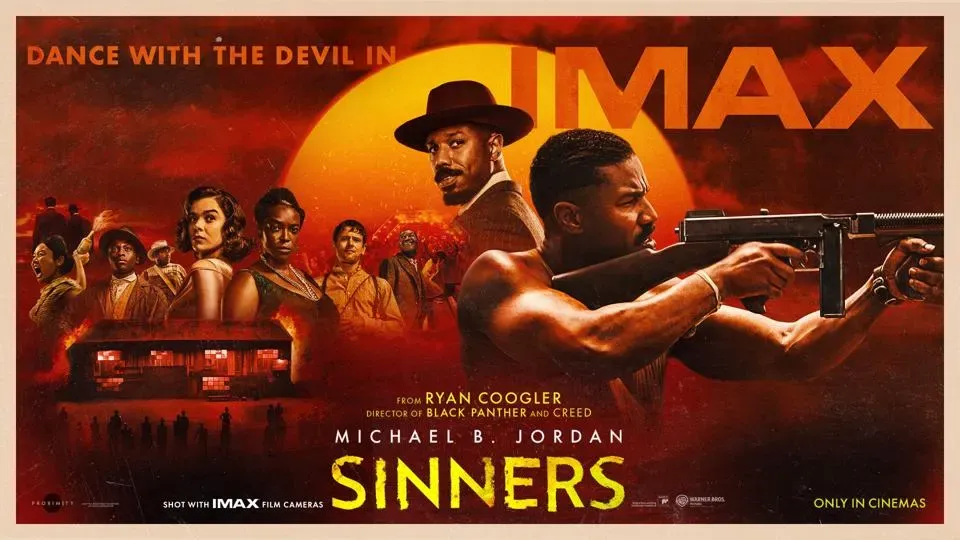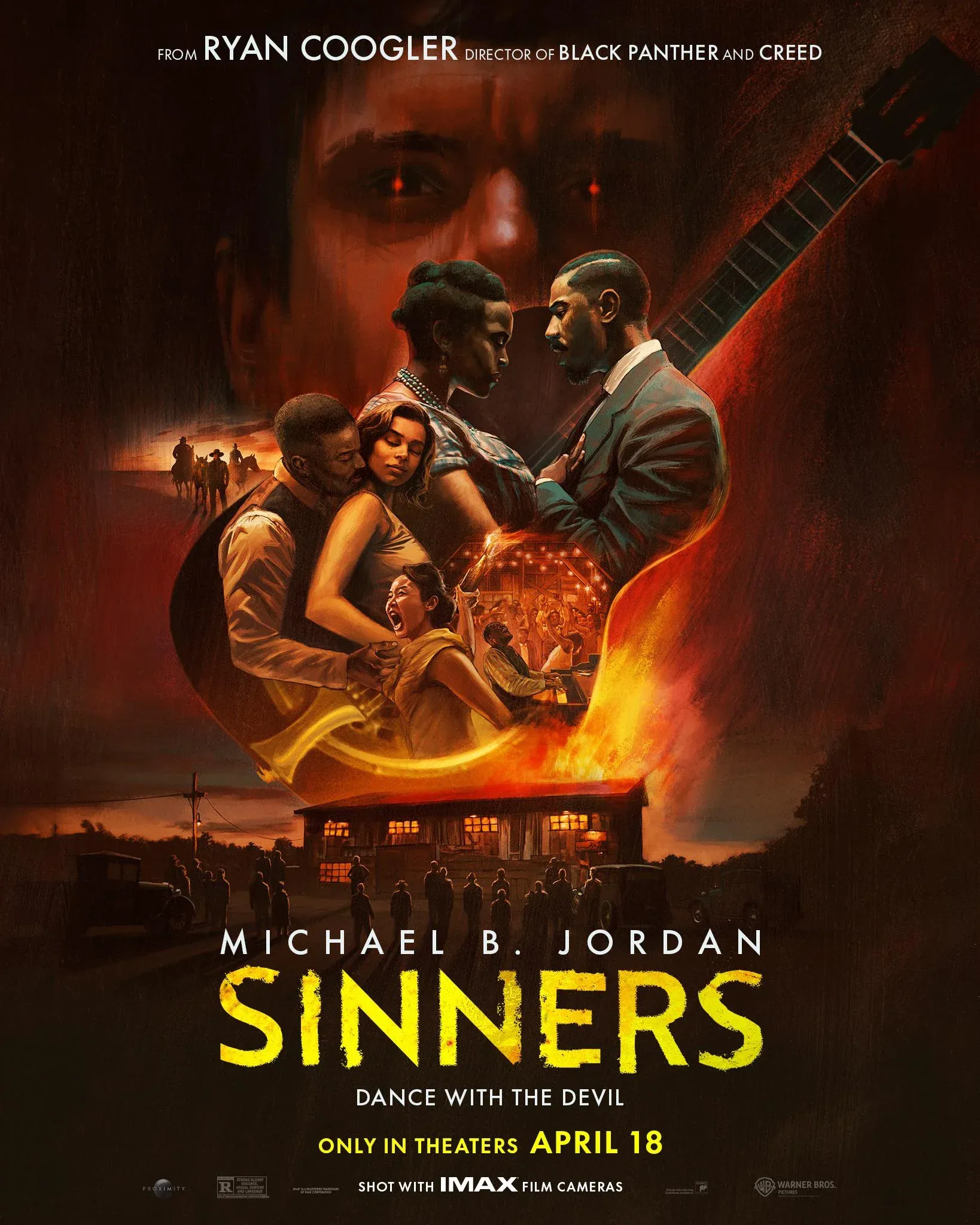Blood, Blues, and Bold Vision: Ryan Coogler's "Sinners" Review
Ryan Coogler's "Sinners" is the kind of film that reminds you why we go to theaters in the first place.

Ryan Coogler's "Sinners" is the kind of film that reminds you why we go to theatres in the first place. It's an audacious, genre-bending masterpiece that refuses to be confined by conventional storytelling, and it announces Coogler's triumphant return to original filmmaking after his successful franchise entries.
A Juke Joint in Hell
Set in 1932 Mississippi Delta, "Sinners" follows identical twin brothers Elijah "Smoke" and Elias "Stack" Moore (both played magnificently by Michael B. Jordan), WWI veterans who return to their hometown after years in Chicago's underworld. Using money stolen from gangsters, they transform an old sawmill into a juke joint for the local Black community, recruiting their musically gifted cousin Sammie "Preacher Boy" Moore (newcomer Miles Caton) along with a colorful cast of characters including veteran pianist Delta Slim (Delroy Lindo), soulful singer Pearline (Jayme Lawson), and Smoke's spiritually attuned wife Annie (Wunmi Mosaku).
What begins as a period drama about community-building in the Jim Crow South takes a shocking turn when Irish immigrant vampire Remmick (Jack O'Connell) arrives with his undead followers. The juke joint's opening night becomes the centrepiece of the film – a transcendent blues performance that unknowingly summons spirits and attracts supernatural attention, culminating in a night of bloodshed, betrayal, and desperate survival.
Genres Collide in Glorious IMAX
Coogler's greatest achievement here is his seamless fusion of seemingly incompatible genres. "Sinners" is simultaneously a Southern Gothic horror, a period drama, a gangster film, a blues musical, and a visceral action thriller – often within the same scene. The genre-blending never feels forced or gimmicky, but organically serves the story's exploration of racism, cultural exploitation, artistic expression, and what freedom truly means.
Shot primarily on IMAX 65mm and Ultra Panavision 70mm film (making cinematographer Autumn Durald Arkapaw the first woman DP to shoot a feature using this combination), "Sinners" is visually sumptuous. The film alternates between aspect ratios – using the wider frame to establish the period setting and the immersive IMAX format for intimate character moments and spectacular set pieces. The visual language employs high contrast and deep shadows, creating a gritty texture that enhances both the horror elements and the film's historical authenticity.
Jordan's Tour de Force
Michael B. Jordan delivers his most complex performance to date, portraying identical twins with distinct personalities, mannerisms, and voices. Smoke is serious and haunted by past grief, while Stack is charming and quicker to smile despite his inner pain. Their differing temperaments inform their interactions, ultimately leading to a devastating confrontation when Stack is turned into a vampire.
The supporting cast is uniformly excellent. Newcomer Miles Caton holds his own as Sammie, the young guitarist torn between his father's faith and his passion for the blues. Wunmi Mosaku brings strength and gravitas to Annie, while Hailee Steinfeld navigates complex emotional terrain as Mary, Stack's former girlfriend who passes for white. Jack O'Connell's Remmick is unsettling and multilayered – not merely a monster but an embodiment of exploitation.
The Sound of the Soul
If the visuals of "Sinners" are arresting, its soundtrack is transcendent. Ludwig Göransson's score masterfully blends traditional blues, ambient textures, and gritty audio design, utilising period instruments and collaborations with legendary blues musicians including Buddy Guy and Cedric Burnside.
Music isn't just background here – it's woven into the narrative's DNA. The film's standout sequence occurs during the juke joint's opening night, where Sammie's playing collapses time and space in a hypnotic long take that brings together ancestral African drummers, electric guitarists reminiscent of Jimi Hendrix, and future hip-hop artists in an ecstatic shared moment. Through this scene and others, "Sinners" presents music as a form of magic, a supernatural force, and ultimately a path to a different kind of immortality than the one the vampires offer.
Thematic Resonance
"Sinners" employs its vampire mythology as a potent allegory. Remmick's desire to control Sammie's unique musical gift literalizes the historical exploitation of Black culture, while his offer of "freedom" from racism through transformation presents a disturbing proposition: assimilation into a predatory structure as escape from another form of oppression.
The film juxtaposes this false promise with the generative power of the juke joint – a space of Black ownership, community, and cultural creation. Through this contrast, "Sinners" suggests that authentic freedom lies not in mirroring oppressive systems but in the vulnerable work of building community and creating art that can transcend time.
A Bold Gambit Pays Off
With its 137-minute runtime and estimated $90-100 million budget, "Sinners" represents a significant gamble for Warner Bros. – an original, R-rated horror film with complex themes and a period setting. But the risk has paid off critically, with the film earning rapturous reviews (98% on Rotten Tomatoes), and commercially, with a strong opening weekend of $45.6 million domestically.
Some critics have noted pacing issues – the film takes nearly an hour to establish its characters and setting before the supernatural horror erupts – or found it occasionally "overstuffed" due to its ambition. But these critiques feel minor against the film's tremendous accomplishments.
Conclusion
"Sinners" cements Ryan Coogler's status as one of our most essential filmmakers. It combines the raw social conscience of his debut "Fruitvale Station" with the technical mastery honed on the "Black Panther" films, all in service of a deeply personal vision.
In a cinematic landscape dominated by sequels and established IP, Coogler has delivered something rare and precious: an original, ambitious work that merges genre entertainment with profound thematic exploration. "Sinners" refutes the notion that "popcorn movies" and "art films" must exist in separate realms, proving that the most resonant cinema can be both simultaneously.
This is filmmaking at its most vital – rousing, layered, and thoroughly entertaining. Don't miss it.






